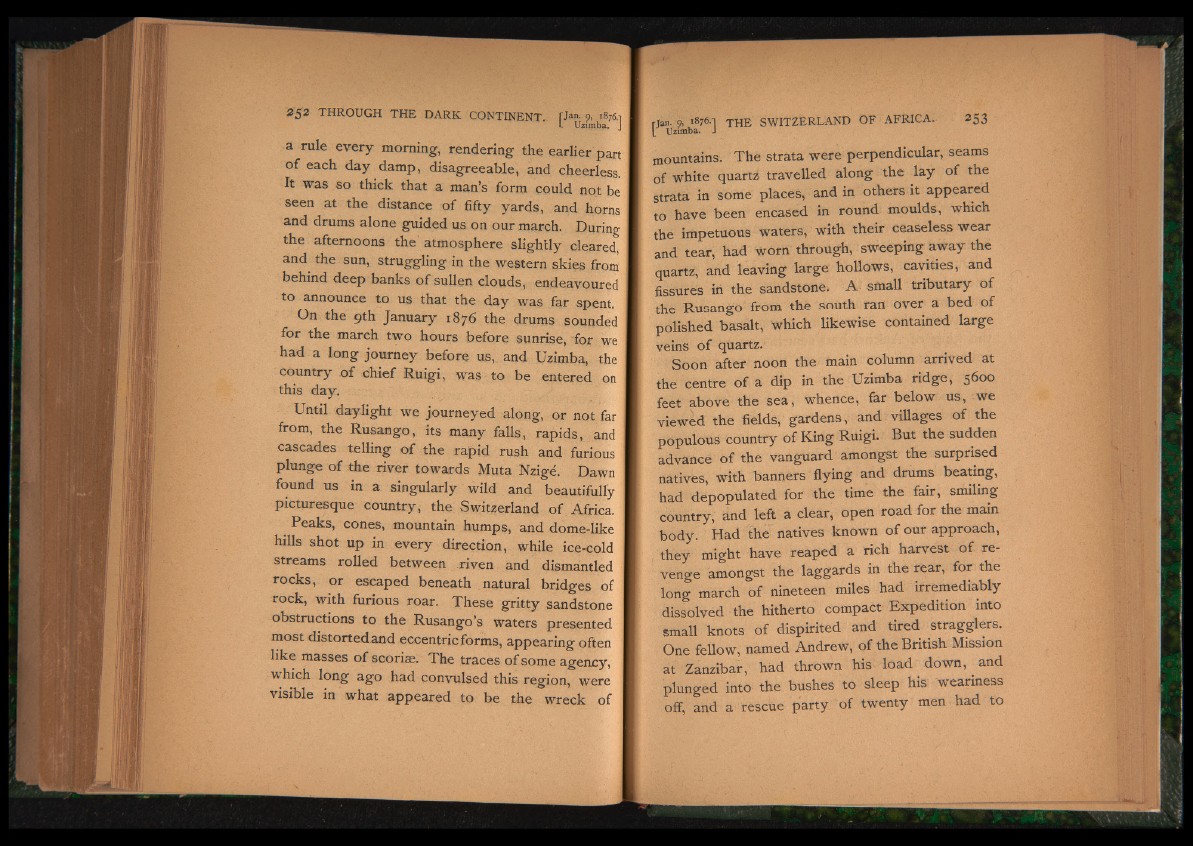
a rule every morning, rendering the earlier part
o f each d ay damp, disagreeable, and cheerless.
It was so thick that a man’s form could not be
seen at the distance o f fifty yards, and horns
and drums alone guided us on our march. During
the afternoons the atmosphere slightly cleared,
and the sun, struggling in the western skies from
behind deep banks o f sullen clouds, endeavoured
to announce to us that the day was far spent.
On the 9th January 1876 the drums sounded
for the march two hours before sunrise, Tor we
had a long journey before us, and Uzimba, the
country o f chief Ruigi, was to be entered on
this day.
Until daylight we journeyed along, or not far
from, the Rusango, its many falls, rapids, and
cascades telling o f the rapid rush and furious
plunge o f the river towards Muta Nzige. Dawn
found us in a singularly wild and beautifully
picturesque country, the Switzerland o f Africa.
Peaks, cones, mountain humps, and dome-like
hills shot up in every direction, while ice-cold
streams rolled between riven and dismantled
rocks, or escaped beneath natural bridges of
rock, with furious roar. These g ritty sandstone
obstructions to the Rusango’s waters presented
most distorted and eccentric forms, appearing often
like masses o f scoriae. The traces o f some agency,
which long ago had convulsed this region, were
visible in what appeared to be the wreck of
rjan. 9, 1876.-1 t h e SWITZERLAND OF AFRICA. 253
|_ Uznnba. J
mountains. The strata were perpendicular, seams
of white quartz travelled along the la y o f the
strata in some places, and in others it appeared
to have been encased in round moulds, which
the impetuous waters, with their ceaseless wear
and tear, had worn through, sweeping away the
quartz, and leaving large hollows, cavities, and
fissures in the sandstone. A small tributary o f
the Rusango from the south ran over a bed o f
polished basalt, which likewise contained large
veins o f quartz.
Soon after noon the main column arrived at
the centre o f a dip in the Uzimba ridge, 5600
feet above the sea , whence, far below us, we
viewed the fields, gardens, and villages o f the
populous country o f King Ruigi. But the sudden
advance o f the vanguard amongst the surprised
natives, with banners flying and drums beating,
had depopulated for the time the fair, smiling
country, and left a clear, open road for the main
body. Had the natives known o f our approach,
they might have reaped a rich harvest o f revenge
amongst the laggards in the rear, for the
long march o f nineteen miles had irremediably
dissolved the hitherto compact Expedition into
small knots o f dispirited and tired stragglers.
One fellow, named Andrew, of the British Mission
at Zanzibar, had thrown his load down, and
plunged into the bushes to sleep his weariness
off, and a rescue party of twenty men had to